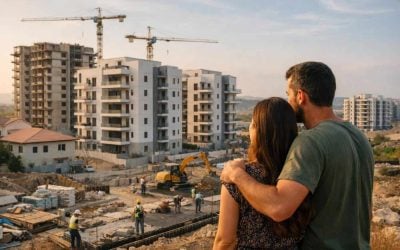Israel’s property sector has continued to expand into early 2025, driven by steady demand, limited housing availability, and evolving policy decisions. While buyers remain active in many regions, rising costs and market shifts have prompted developers, landlords, and government bodies to adjust their strategies.
Key Developments
Housing Prices on the Rise
Recent figures suggest that residential property values in Israel have risen by approximately 8% over the past year, with overall building expenses increasing by about 5% in the same period. This steady growth reflects consistent demand as newcomers to the market and returning buyers compete for a limited pool of homes.
Rental Market Adjustments
In central metropolitan areas, especially around Tel Aviv, the rental sector is feeling pressure from both elevated price tags and new construction initiatives. Landlords in business-heavy districts have made modest rate reductions to fill vacant units. These adjustments come amid a notable slowdown in renting interest tied to broader economic concerns and lingering effects from recent regional security events.
Smaller Firms Driving Construction
A nationwide review indicates that nearly two-thirds of new residences in Israel are currently built by small and medium-Sized firms. As of late 2024, there were over 180,000 Apartments under active construction sites across the country. These findings highlight the pivotal influence that smaller developers have in meeting Israel’s housing needs.
Major Retail Expansion
Israel’s largest shopping complex has recently added an expansive floor covering about 13,000 square meters, featuring around 55 additional commercial outlets. The new section, offering both international brands and local dining options, underscores the country’s rising consumer activity and ongoing investment in large-scale commercial projects.
Regulatory Setbacks for Rental Platforms
A proposed measure requiring online home-sharing platforms to disclose income information on Israeli hosts was ultimately turned down in the legislature. This decision affects how short-term rentals and broader home-sharing services will be regulated, leaving more traditional methods of tax reporting in place for now.
Surge in Overseas Buyers
Market observers have noticed growing interest from foreign investors, particularly in Jerusalem and other central locales. The heightened curiosity is linked to various global factors, including the desire for greater personal involvement in Israel and perceived long-term security in the nation’s property market.
Impacts and Analysis
Recent developments have underscored the continuing tension between high demand and limited housing supply. As new apartment towers and commercial projects break ground, construction costs are still climbing, in part due to labor shortages and expensive raw materials. This climate of rising costs can push sale prices and rental rates even higher, challenging affordability for local residents.
Moreover, government-led reforms—some enacted and others proposed—aim to ease the housing crunch. Tax debates, incentives for long-term rentals, and region-focused grants have all played a role in shaping the market’s trajectory. While these policies could offer relief over time, many potential buyers and tenants still feel Immediate financial strain.
Expert Insights
Analysts watching Israel’s real estate sector suggest that high demand for both rentals and purchases will likely persist, fueled by population growth and sustained interest from abroad. However, experts caution that prolonged cost increases could eventually soften buying activity, especially if wage growth does not keep pace with mortgage payments. Some industry observers anticipate that new regulations or infrastructure projects might broaden housing availability in select regions, but warn against assuming a swift drop in home prices.
Conclusion
Israel’s real estate market continues to display strong demand, new development projects, and a variety of policy measures—all of which contribute to a complex environment for homebuyers, renters, investors, and developers alike. As the year progresses, questions about affordability, interest rates, and construction costs will remain center stage. Looking ahead, market participants will monitor how emerging policies, global economic factors, and regional developments interact to shape the next phase of Israel’s dynamic property landscape.




